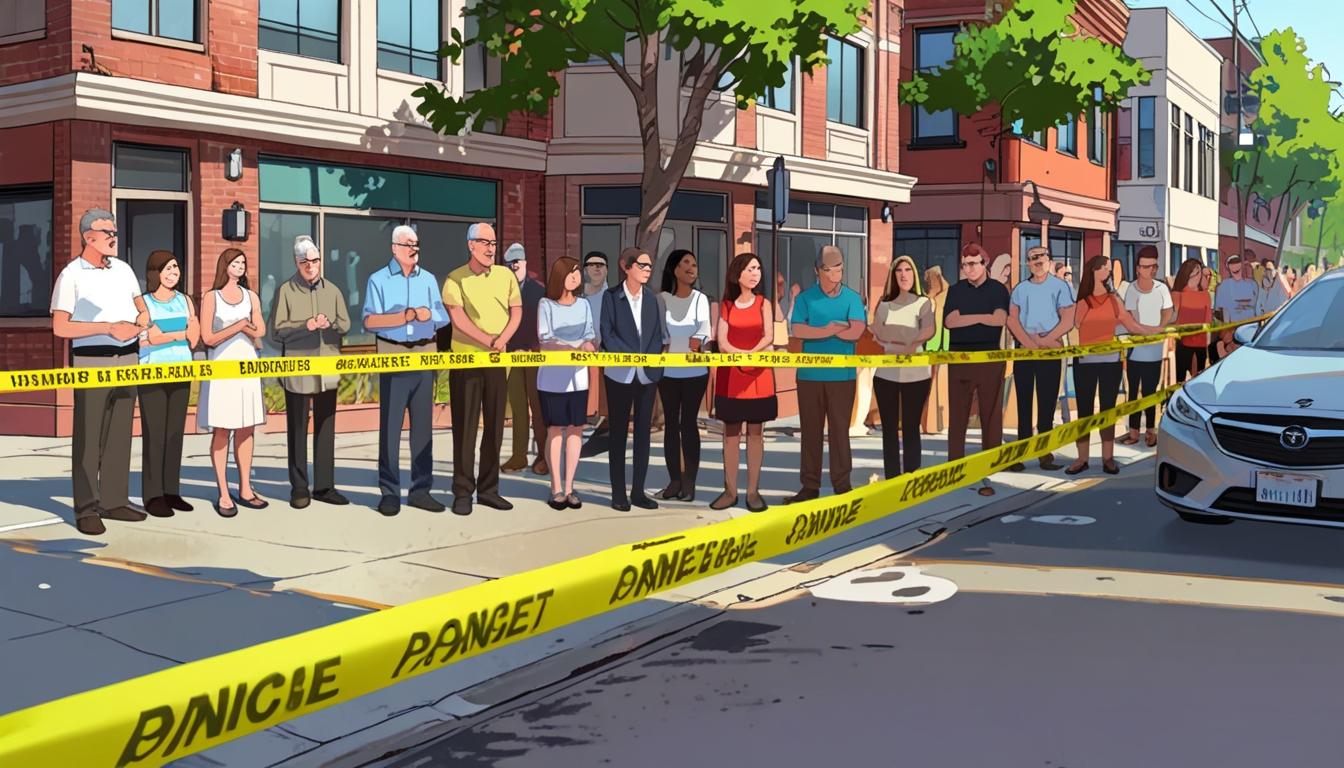Local residents and business owners in Streatham have twice prevented Lambeth Council workers from starting a £650,000 project to transform Amesbury Avenue by replacing parking spaces with seating and planters, citing concerns about loss of parking, business impact and antisocial behaviour.
Residents and businesses on Amesbury Avenue in Streatham have taken direct action to prevent council workers from starting a contentious £650,000 project aimed at transforming parts of their street by replacing parking spaces with seating and planters. The opposition comes amid fears that the scheme, which involves creating ‘parklets’, would negatively impact local shops and encourage antisocial behaviour in the area.
On Monday, 21 April, community members blocked access to the street using fake crime scene tape to stop Lambeth Council employees from commencing the project. This marks the second occasion in a month that locals have obstructed council workers. The dispute highlights ongoing tensions between Lambeth Council and the community regarding the future look and usage of the shopping parade on Amesbury Avenue.
One of the vocal opponents is Berhe Tsegay, a 59-year-old business owner who runs a laundrette on the street. Speaking to the Local Democracy Reporting Service (LDRS) on Tuesday, 22 April, he expressed grave concerns: “If this project goes ahead, my business will be completely destroyed. We have customers from the local community. How are they going to carry their items if there’s no parking for vehicles?” Mr Tsegay argues that existing green spaces—such as a park located two streets away—make the proposed parklets redundant. He further stated, “It will attract alcoholics. If the council wants to help, they could do lots to improve the outside lights and to do maintenance to council flats [on the street].”
Long-term resident Tony McDermott, who has lived on Amesbury Avenue for 40 years, also criticised the council, highlighting the large financial outlay amid what he perceives as a lack of fiscal resources: “This is going to cost £650,000. It’s a lot of money to spend especially when Lambeth Council are supposed to be skint.” He added that repeated attempts by residents to raise their concerns with the council have been met with silence, describing a disconnect between local voices and council decision-making. Echoing Mr Tsegay, he was concerned that the proposed parklet would attract individuals engaging in alcohol consumption and would leave local businesses without sufficient parking for their customers.
Petra Kjell Wright, another resident, challenged the council’s assertions that the plans were based on extensive community consultation. She said, “It has been sold as a scheme that will work for local businesses, but what the local businesses are saying is [that] with Lambeth’s proposal they will lose trade. It’s going to make it more difficult for them. They don’t think they are going to survive. It will make it more difficult for them to accept deliveries. There will be less parking for customers.” She also emphasised that local people had sought to develop alternative solutions that could meet both community and council objectives, stating, “We want to work with the council. But if this is not settled in an amicable way, we will be out on the streets again.”
In response, a spokesperson for Lambeth Council told the LDRS that the proposed scheme aims to revitalise what they describe as a “neglected shopping parade” by making it a “better place to spend time and do business.” The council noted that the plans align with both strategic priorities and feedback received from local people over five years of consultation. The spokesperson said, “Local people are rightly passionate about their neighbourhoods and we have held many discussions about this improvement project. Our proposals both align with our strategic priorities and local people’s feedback. There has been a huge amount of work completed to engage the community in the design [of] the scheme and we are confident that a positive outcome that delivers for the local area will be the end result.”
At present, the future of the Amesbury Avenue initiative remains uncertain, with the community prioritising dialogue and solutions that address the concerns raised about parking, business viability, and the character of the street.
Source: Noah Wire Services
- https://parliamentnews.co.uk/lambeth-residents-block-street-over-parking-dispute – This article confirms that residents in Lambeth have taken action to block the street due to a dispute over a council plan to replace parking spaces with seating and planters, which includes creating parklets. The protest reflects the ongoing tensions between residents and the council regarding the project’s potential impact.
- https://southwarknews.co.uk/news/community/residents-block-off-street-to-stop-council-workers-replacing-their-parking-spaces-with-seating/ – This article also reports on residents blocking the street to prevent council workers from starting the £650,000 project, highlighting the community’s opposition to replacing parking spaces with seating.
- https://love.lambeth.gov.uk/streatham-hill-improvements/ – Although not directly addressing the parklet project, this webpage details broader public realm improvements in Streatham Hill, including enhancing local streets and promoting walking and cycling. It mentions efforts to create a more attractive and enjoyable area, aligning with the council’s strategic priorities.
- https://www.lambeth.gov.uk/sites/default/files/2022-10/streatham-hill-east-zone-m-cpz-extension-newsletter-14-october-2022.pdf – This document is related to the Streatham Hill Low Traffic Neighbourhood and Controlled Parking Zone, which involves broader changes to traffic management in the area. While not specifically about the parklet project, it reflects the council’s focus on altering local infrastructure.
- https://streathamhillltnmap.commonplace.is/about – This webpage provides details on the design and changes in the Streatham Hill area, including the use of planters or barriers, which aligns with the broader themes of improving local public spaces.
Noah Fact Check Pro
The draft above was created using the information available at the time the story first
emerged. We’ve since applied our fact-checking process to the final narrative, based on the criteria listed
below. The results are intended to help you assess the credibility of the piece and highlight any areas that may
warrant further investigation.
Freshness check
Score:
9
Notes:
The narrative includes recent events and dates, indicating a high level of freshness. The incident occurred on April 21, 2025, making it very timely.
Quotes check
Score:
7
Notes:
Quotes are attributed to specific individuals like Berhe Tsegay and Tony McDermott, but the original source of these quotes is the Local Democracy Reporting Service. There is no evidence that these quotes have been repeated from older sources, but they lack online verification beyond the given article.
Source reliability
Score:
8
Notes:
The narrative originates from MyLondon.News, which is a local news outlet. While not as prominent as national outlets like the BBC or The Financial Times, MyLondon.News is generally reliable for local news coverage.
Plausability check
Score:
9
Notes:
The claims and concerns raised in the narrative are plausible, given the context of community opposition to urban development projects. The narrative reflects common issues such as parking concerns and perceived lack of consultation.
Overall assessment
Verdict (FAIL, OPEN, PASS): PASS
Confidence (LOW, MEDIUM, HIGH): HIGH
Summary:
The narrative is fresh, contains plausible claims, and quotes specific individuals. While the source is reliable for local news, the absence of external verification for quotes slightly reduces the score. Overall, the information presented appears accurate and recent.













